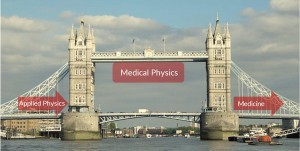What is medical physics ?
Medical Physics is the application of physics to healthcare; using physics for patient imaging, measurement and treatment.
(EFOMP, what is medical physics)
Medical Physics is a branch of applied physics, pursued by medical physicists, that uses physics principles, methods and techniques in practice and research for the prevention, diagnosis and treatment of human diseases with a specific goal of improving human health and well-being. Medical physics may further be classified into a number of sub-fields (specialties), including radiation oncology physics, medical imaging physics, nuclear medicine physics, radiation protection in medicine, non-ionizing medical radiation physics, and physiological measurement. It is also closely linked to neighbouring sciences such as biophysics, biological physics, and health physics.
(IOMP, medical physics)
What is a medical physicist ?
Medical Physicist
Medical physicists are professionals with education and specialist training in the concepts and techniques of applying physics in medicine. Medical Physicists work in clinical, academic or research institutions.
(IOMP, medical physics)
Medical physicists working in clinical environment are health professionals, graduate scientists, holding post-graduate qualifications, with education and specialist training in the concepts and techniques of applying physics in medicine, competent to practice independently in one or more of the sub-fields (specialties) of medical physics. The requirements for education and specialist training of medical physicists working as health professionals in Switzerland are set out in guidelines for obtaining the SSRMP medical physics certification.
Role and Responsibilities in clinical practice
“Medical physics experts will contribute to maintaining and improving the quality, safety and cost-effectiveness of healthcare services through patient-oriented activities requiring expert action, involvement or advice regarding the specification, selection, acceptance testing, commissioning, quality assurance/control and optimised clinical use of medical radiological devices and regarding patient risks from associated ionising radiations including radiation protection, installation design and surveillance, and the prevention of unintended or accidental exposures; all activities will be based on current best evidence or own scientific research when the available evidence is not sufficient.”
(Mission statement of Medical Physicists, RP-174 European Guidelines on Medical Physics Expert, EU publications on medical exposure)
“The essential responsibility of the qualified medical physicist’s clinical practice is to assure the safe and effective delivery of radiation to achieve a diagnostic or therapeutic result as prescribed in patient care. The medical physicist performs or supervises the technical aspects of procedures necessary to achieve this objective. The responsibilities of the medical physicist include: protection of the patient and others from potentially harmful or excessive radiation; establishment of adequate protocols to ensure accurate patient dosimetry; the measurement and characterization of radiation; the determination of delivered dose; advancement of procedures necessary to ensure image quality; development and direction of quality assurance programs; and assistance to other health care professionals in optimizing the balance between the beneficial and deleterious effects of radiation; and compliance with applicable federal and state regulations.”
(AAPM, scope of practice of clinical medical physics)
(AAPM, Redefining and Reinvigorating the Role of Physics in Modern Medicine)
(AAPM, Leadership and Medical Physicists)
Medical Physics is a vital part of the cost effective health care of the future
Every day the pressures on health care professionals to make their industry more cost effective are increasing. Into the next century, as society and the government deal with the financial realities of an aging population, these pressures will intensify. Medical physics can play a key role in this area. Participation in your organization’s program by qualified medical physicists can produce billable services, save money on equipment negotiation and prevent mistakes that can eventually cost thousands of dollars.
(AAPM, Info for Hospital Administrator)


